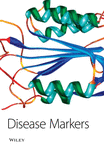Glycosylation Changes on Serum Glycoproteins in Ovarian Cancer May Contribute to Disease Pathogenesis
Abstract
Ovarian cancer is the most lethal of all gynaecological cancers among women. Serum CA125 is the only biomarker that is used routinely and there is a need for further complementary biomarkers both in terms of sensitivity and specificity.
N-glycosylation changes in ovarian cancer serum glycoproteins include a decrease in galactosylation of IgG and an increase in sialyl Lewis X (SLex) on haptoglobin β-chain, α1-acid glycoprotein and α1-antichymotrypsin. These changes are also present in chronic inflammation but not in malignant melanoma, where there are low levels of inflammatory processes. Acute phase proteins carrying increased amounts of SLex have an increased half-life. Sialylation of acute phase proteins also decreases apoptosis favouring survival of cancer cells. Cancer cells produce inflammatory cytokines which influence glycosylation processing in liver parenchymal cells. Altered glycosylation of the acute phase protein transferrin plays an important role in iron homeostasis. Glycosylated transferrin and its glycans have anti-apoptotic properties and many transferrin receptors in carcinoma could play a role in development of anaemia. Decreased galactosylation and sialylation of IgG increases the cytotoxicity of natural killer cells and complement activation via mannose-binding lectin (MBL). Altered glycosylation of acute phase proteins and IgG suggests that cancer regulates certain pathways favouring cancer cells survival.




